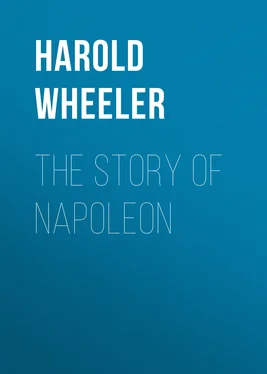Harold Wheeler - The Story of Napoleon
Здесь есть возможность читать онлайн «Harold Wheeler - The Story of Napoleon» — ознакомительный отрывок электронной книги совершенно бесплатно, а после прочтения отрывка купить полную версию. В некоторых случаях можно слушать аудио, скачать через торрент в формате fb2 и присутствует краткое содержание. Жанр: foreign_prose, История, foreign_edu, foreign_antique, на английском языке. Описание произведения, (предисловие) а так же отзывы посетителей доступны на портале библиотеки ЛибКат.
- Название:The Story of Napoleon
- Автор:
- Жанр:
- Год:неизвестен
- ISBN:нет данных
- Рейтинг книги:4 / 5. Голосов: 1
-
Избранное:Добавить в избранное
- Отзывы:
-
Ваша оценка:
- 80
- 1
- 2
- 3
- 4
- 5
The Story of Napoleon: краткое содержание, описание и аннотация
Предлагаем к чтению аннотацию, описание, краткое содержание или предисловие (зависит от того, что написал сам автор книги «The Story of Napoleon»). Если вы не нашли необходимую информацию о книге — напишите в комментариях, мы постараемся отыскать её.
The Story of Napoleon — читать онлайн ознакомительный отрывок
Ниже представлен текст книги, разбитый по страницам. Система сохранения места последней прочитанной страницы, позволяет с удобством читать онлайн бесплатно книгу «The Story of Napoleon», без необходимости каждый раз заново искать на чём Вы остановились. Поставьте закладку, и сможете в любой момент перейти на страницу, на которой закончили чтение.
Интервал:
Закладка:
Napoleon applied himself with his usual industry to straightening out the tangled skein of family troubles. He found it by no means an easy matter, especially as the French Government was involved. The latter had been anxious to introduce the silk industry in their new dependency, and Charles Bonaparte had been one of the first to seize upon the idea because he thought there was “money in it.” In 1782 he had made a plantation of young mulberry trees for the purpose of rearing silkworms, but instead of handing over the whole of the money which had been agreed upon in advance, 2700 livres still remained to be paid by the State. On the strength of a certificate of ill-health, Napoleon’s leave was extended from the end of March 1787, to the beginning of December, and later until the 1st June 1788. He wandered about the island, visiting his old haunts and companions, but more often finding his greatest consolation in lonely communion with Nature. Sometimes he would turn to his literary pursuits, adding a few paragraphs to a “History of Corsica,” which was occupying some of his leisure moments. He also composed a short story dealing with English history, entitled “The Count of Essex.” A novel having its setting in Corsica followed, and another attempt at fiction, which he called “The Masked Prophet,” perhaps the best of the three as regards literary style.
On the 12th September 1787, he left Corsica for Paris, in order to clear up the matter of the mulberry trees. He found it impossible to exact money from a bankrupt exchequer, and although he pressed the claim no success attended his efforts. Napoleon accordingly returned to Ajaccio, where he spent part of his spare time drawing up plans for the defence of places round the coast, and postponed his departure until the day he was due to join his regiment at Auxonne. Ever of a calculating nature, the young officer rightly surmised that in those days of lax discipline his absence would not be noticed, or if it were that the insubordination would be passed over.
In the following August (1788) it became evident that the serious work he had put in while his companions were lounging about or frittering away their time was beginning to have its due effect. He became a member of a commission appointed to inquire into the merits or demerits of certain pieces of artillery, and one of the duties—no slight one—which fell to his share was the drawing up of the report. Misfortune, however, had not altogether ceased paying him unwelcome attentions, and, for some reason or other, probably a matter connected with some work on the fortifications of which he had the oversight, Napoleon was placed under arrest for a day.
His own scheme of education went on apace, as his manuscript note-books, now in the Lorenzo Medici Library at Florence, abundantly testify. One of the works singled out by him for attention was a French translation of Barrow’s “History of England, from the Times of Julius Cæsar to the Peace of 1762.” His remarks show that he had a special admiration for such men as Hereward the Wake, familiar to all of us in the pages of Kingsley, or in the more recently published historical romance, “The Story of Hereward,” by Mr Douglas C. Stedman; Simon de Montfort, whom Napoleon terms “one of the greatest Englishmen”; and the Earl of Arundel, who “died a martyr for the liberty of his country.” Cromwell, he says, “was in his early days a libertine. Religion took possession of him, and he became a prophet. Courageous, clever, deceitful, dissimulating, his early principles of republican exaltation yielded to the devouring flame of his ambition, and, after having tasted the sweets of power, he aspired to the pleasure of reigning alone. He had a strong constitution, and had a manly but brusque manner. From the most austere religious functions he passed to the most frivolous amusements, and made himself ridiculous by his buffoonery. He was naturally just and even-tempered.” Many of these remarks might be applied not inaptly to Napoleon himself, and if he is not absolutely just to Cromwell, they show that he had a very good understanding of the Protector’s general character, and that he read to learn and not simply to “kill time,” or for amusement.
In April 1789 was heard the distant rumble which heralded the French Revolution, before it broke out in all its hideous extravagancies. Riots had taken place at Seurre, but as in the case of the affair at Lyons, they were quelled before Napoleon or his colleagues put foot in the place. Two months of enforced idleness were spent in the former town before the company was marched back to its headquarters at Auxonne without having had the slightest chance to distinguish itself. When it could have proved useful it broke into open mutiny. This was in July 1789, when a riot took place and the soldiers joined the rebels.
Napoleon had now completed his “History of Corsica,” and on the disgrace of Marbeuf, Bishop of Sens, to whom he had hoped to dedicate it, he decided to ask Paoli to become his patron. He sent him his precious manuscript feeling assured that it would be well received, but the acknowledgment was a rebuff couched in courteous terms. Moreover, the original was mislaid by Paoli, and this unfortunate happening went far to shake the faith of its writer in the great Corsican leader at a later date.
It is now necessary for us to try to understand in some measure the aims and objects of the vast disturbance known to history as the French Revolution. For generations the monarchy and aristocracy of France had refused to listen to the cry of the oppressed people whom they governed. The State was grossly mismanaged; money which should have remained in the pockets of the distressed people was exacted from them and given to unworthy Court favourites, who spent it in a variety of ways which did not benefit the nation. The nobles and titled clergy paid no taxes, the burden thus fell with undue weight on the middle classes—even now the milch-cow of the State—and the peasants, who toiled day and night for bread. Serious reform was always postponed, although it had been attempted by King Louis XVI. in a feeble and half-hearted way.
A bitter hatred of the persons, institutions, and traditions which contributed to this undesirable state of things was the inevitable consequence; as so often happens, those who desired the righting of wrongs carried their measures too far. “Liberty, equality, and fraternity” were the passwords of the leaders of the new order, but obviously the ideal could not be brought about when nearly everybody held a different theory as to how the abuses were to be rectified. The writings of such philosophers as Montesquieu, Voltaire, and Rousseau, all of which had been diligently perused by Napoleon, had done much to fan the smouldering embers into flames. Soon the whole land was ablaze, massacres became of daily occurrence, the King and Queen paid the price with their heads, the monarchies of Europe were shaken to their very foundations. And what did the people get in exchange for this giant upheaval? The iron despotism of one man, who continued the Revolution in his own person; made the Continent one vast battlefield; drew from France her best manhood and her treasure, and left her territory smaller than when he first put foot on her soil.
At the moment it was impossible for Napoleon to realise the true meaning of the dreadful events which were approaching with such unrestrained rapidity. He foresaw the end of the old state of affairs, and rightly conjectured that they would be swept away never to return; but Corsica was the centre of his interests rather than France. Rent asunder by conflicting ambitions and civil war, his native island might yet tear herself from her hated conquerors. So at least he told himself in his moments of reflection.
In September 1789, Bonaparte again obtained leave of absence until the 1st June 1790. His health was by no means good when he embarked at Marseilles; a mutiny had occurred in his regiment, and altogether his outlook was as gloomy as ever. Freedom from his irksome military duties, however, and the bracing effect of the sea-air rapidly revived his drooping spirits and failing energy.
Читать дальшеИнтервал:
Закладка:
Похожие книги на «The Story of Napoleon»
Представляем Вашему вниманию похожие книги на «The Story of Napoleon» списком для выбора. Мы отобрали схожую по названию и смыслу литературу в надежде предоставить читателям больше вариантов отыскать новые, интересные, ещё непрочитанные произведения.
Обсуждение, отзывы о книге «The Story of Napoleon» и просто собственные мнения читателей. Оставьте ваши комментарии, напишите, что Вы думаете о произведении, его смысле или главных героях. Укажите что конкретно понравилось, а что нет, и почему Вы так считаете.












